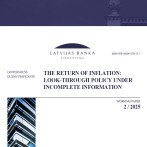Annual inflation was stable in April
In April 2015, the annual inflation did not change substantially and was 0.5%. The slight rise was caused by a more pronounced rise in the seasonally fluctuating prices of goods. The world oil prices rose slightly and they were followed by the fuel market. The rise in oil prices in the world was compensated by the trends in food prices in which a certain role was played by the lifting of the European Union (EU) milk production quotas. The global trends in food prices, however, were not fully reflected in the price dynamic of consumer goods in Latvia.
The April rise in oil prices compared to the average level in March was not fast, and, except for some special sales, fuel merchants continued to slowly raise retail prices of fuel (they rose by an average of 0.3%). Yet not all energy prices follow the oil market at the same pace. AS "Latvijas Gāze" published a new outlook for the development of natural gas tariffs and augmented the drop in the expected gas price for the industrial producers in June in addition to predicting a possible further reduction in tariffs for these consumers in July. If such tariffs come to pass, the heat energy bills for households will not change for the most part, because heat energy is hardly consumed at all in summer. Given such a purchasing price of natural gas, its price for households could also drop. Yet that would also likely be reflected in the bills of subsequent periods.
The world food prices in April continued to drop, compensating the trend in oil prices. The Food and Agriculture Organization of the United Nations (FAO) index of agricultural and food prices contracted in a majority of groups of goods, including dairy products where such a factor as the abolishing of milk production quotas in the EU countries acted in the direction of reduction. Although in April the prices of dairy products in Latvia did not drop (except for cheese), the retail prices of Latvian dairy products tend to follow the global price trends rather than the local raw materials market (the seasonal pattern of retail prices of dairy products does not coincide with that of purchasing prices), moreover, in external trade as well, conditions do not promote a rise in prices, and these factors could prevent rise in food prices in Latvia in the near future.
The FAO published evaluation of the cereals' stock to use ratio for the next season is lower than the very high estimation for this season, thus the rise in grain prices in the world could also likely resume and impact the Latvian food price level in the next season accordingly. In April, however, the price dynamic in the Latvian market was very different for cereal products (month-on-month and year-on-year rises) and for bread and pastry (month-on-month and year-on-year drops). It is interesting to note that even after the relatively warm winter and reduced heat energy prices, the month-on-month rises in vegetable and potato prices are untypically high for April (a rise this fast in this group of goods was a first since 1998).
Characteristically for the season, but faster than average for the spring season, the prices went up on footwear. Such a rise in prices on footwear in the spring season, including April, was not observed even during the so-called boom period, and thus the total rate of year-on-year price rises also increased for "other tradable goods". The services price level remained stable as expected: the prices of services whose prices are not regulated in April kept exceeding 2% (even rising slightly compared to March), but the core inflation level keeps at least at the 1.5% level. In the coming months, some events related to the Latvian Presidency of the EU Council and some unrelated cultural events in June and July will act to support the stability of service prices. If the price level of energy and food remains lower than last year, then the effect of redistribution of consumer expenditure could still be at work. Yet an increasingly greater role in the overall development of core inflation will be played by the domestic (rising income) factors.
Textual error
«… …»






